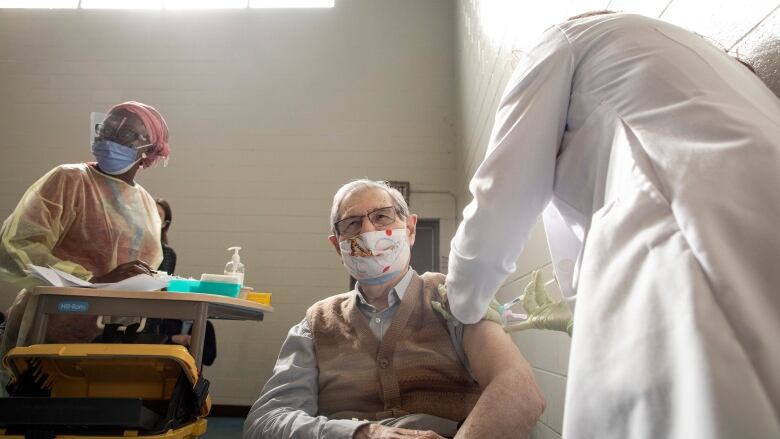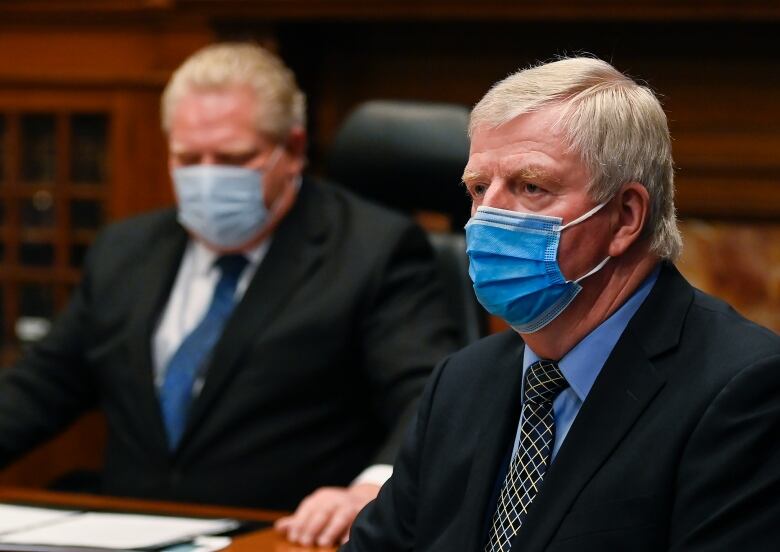Ontario reports 1,553 new COVID-19 cases, Ford again pushing for more vaccines
The seven-day average of daily cases is now at 1,427

Ontario reportedanother 1,553 cases of COVID-19 on Thursday as Premier Doug Ford defended the province's vaccine rollout and booking system.
The new cases include 404 in Toronto, 294 in Peel Region and 176 in York Region. Ottawa, which recorded 82 more cases, will move into the red-"control" tier of Ontario's restrictions framework on Friday.
The infectionscome as labs completed 58,560 tests for SARS-CoV-2, the virus that causes COVID-19, and logged a positivity rate of 3.1 per cent.
The seven-day average of daily cases climbed to 1,427, its highest point since February 7.
Other public health units that saw double-digit increases in cases were:
- Durham Region: 85
- Hamilton: 80
- Lambton: 48
- Waterloo Region: 43
- Halton Region: 38
- Eastern Ontario: 33
- Windsor-Essex: 33
- Thunder Bay: 30
- Niagara Region: 28
- Middlesex-London: 24
- Sudbury: 24
- Wellington-Dufferin-Guelph: 18
- Chatham-Kent: 15
- Simcoe Muskoka: 15
- Kingston, Frontenac and Lennox & Addington: 12
- Leeds, Grenville and Lanark District: 12
- Brant County: 11
- Northwestern: 11
(Note: All of the figures used in this story are found on the Ministry of Health's COVID-19 dashboard or in itsDaily Epidemiologic Summary. The number of cases for any region may differ from what is reported by the local public health unit on a given day, because local units report figures at different times.)
According to Critical Care Services Ontario (CCSO), a government agency that compiles a daily report for hospitals and health organizations, there were 361people with COVID-19 in the province's intensive care units as of yesterday. Twenty-seven of those patients had been admitted in the previous 24 hours. Admissions of COVID-19 patients to ICUs peaked in mid-January at around 420, the CCSO says.
Today's provincial update includes confirmation of twomore cases of the B117 variant of concern, first identified in the United Kingdom. There have now been 1,136cases of B117identified through whole genomic sequencing, an intensive laboratory process that can result in reporting lags of several weeks.
That means the actual number of cases caused by variants of concern is much higher. A total of 10,291 samples that tested positive for COVID-19 also screened positive for the telltale genetic mutation that indicates the presence of a variant. It then requires whole genomic sequencing to know if it is the B117 variant, or one of the variants first identified in South Africa and Brazil, which are also present in Ontario.
At a press conference Thursday afternoon, Medical Officer of Health Dr. David Williams said he believes Ontario has managed to slow growth of the variants, at least somewhat.
"Nevertheless it is rising, so we have to be extra cautious in the weeks ahead," he said.

Meanwhile, public health units also reported another 15 deaths of people with COVID-19. The official toll now sits at 7,202.
At a provincialpress conference Thursday in Hamilton, the premier said public response to the vaccine rollout has been "absolutely enormous."
Ford said over 400,000 people have booked vaccine appointments so far. He once again pressed the federal government to deliver more vaccines to the province.
"We need the federal government to step up, and ensure we get enough doses," he said.
Ford also said the province has built flexibility into its rollout plan, depending on supply.
"All we want is consistency we can move on a dime," he said.
You can use the CBC News vaccine tracker to see how Ontario stacks up with the rest of the country.
More doses expected to arrive by month's end
Public health units administered 58,119doses of vaccines on Wednesday, just short of the record high set the day before.
Ford, as well as members of Ontario's COVID-19 vaccine task force, have said that overall capacity for getting shots into arms could be quadrupled once a consistent supply of vaccines is flowing from the federal government.
Some two million total doses are anticipated to havearrived in Ontario by the end of month. Phase 2 of the government's rollout plan, which will distribute vaccines based on age and relative risk level, is slated to begin in April.
This week saw several significantdevelopments.
The province's online portal and call centre for booking vaccine appointments went live Monday, though for now spots are limited to adults aged 80 and older. Two temporary workers hired to help staff the call centre told CBC News they got little training, with one referring to the launch as a "shambles."
Ford, for his part, said the province experienced"couple of bumps in the road" on the day the program launched.
Then on Wednesday, three mass vaccination clinics opened in Toronto. Three more are scheduled to open by the end of March.
The Ministry of Health says that, as of last night, 47.4 per cent of Ontarians aged 80 and older have received at least one dose of a vaccine.
But there are still many unanswered questions about the unfolding rollout. Among them are:
Will Ontario give the AstraZeneca vaccine to people aged 65 and older?
The National Advisory Committee on Immunizations (NACI) recently revised its recommendations forthe AstraZeneca vaccine, deeming it safe for use in adults 65 and older. Ontario had initially planned to use the vaccine first for people aged 60 to 64, then eventually in younger age groups.
Ford didn't give a straight answer with any specifics when asked Thursday, days after NACI's decision, but did say:"I think it's good news that we can use AstraZeneca for 60 plusall the way up."
Ford also commented on reports of a U.S.planto send roughly 1.5 million doses of theAstraZenecavaccine that the countryis not using toCanada through a loan deal.
"God bless America, they're coming to our rescue," Ford said. However, because this is the AstraZeneca vaccine, it remains unclear how the province would use those doses.
Will vaccine supply be throttled in health units that get ahead of the official schedule?
Some public health units are moving faster than others when it comes to vaccinations. York Region, for example, has opted to already open appointments to residents 75 years old and above, as well as high-priority health-care workers. Local health officials there said the move was prompted by a slowdown in appointments for residents aged 80 and above.
Will doses that may have otherwise gone to York be diverted to other public health units that are still working through the highest priority groups and their oldest residents? The province has not yet said.
Who, if anyone, will replace RickHillier as chair of the vaccine task force?
Retired general Rick Hillier confirmed this week that he would not continue as chair of Ontario's vaccine task force after the term of his Order in Council expires at the end of March.
With files from Mike Crawley, Lucas Powers and Adam Carter












_(720p).jpg)


 OFFICIAL HD MUSIC VIDEO.jpg)
.jpg)



























































































